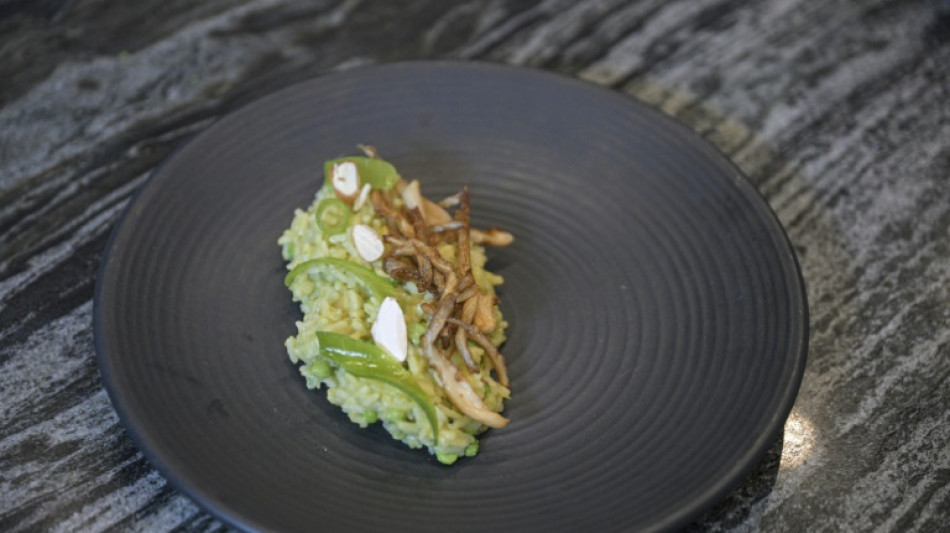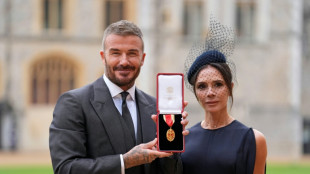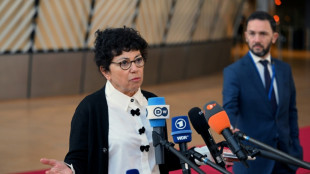
-
 New lawsuit alleges Spotify allows streaming fraud
New lawsuit alleges Spotify allows streaming fraud
-
Stocks mostly drop as tech rally fades

-
 LIV Golf switching to 72-hole format in 2026: official
LIV Golf switching to 72-hole format in 2026: official
-
Manchester City have become 'more beatable', says Dortmund's Gross

-
 Merino brace sends Arsenal past Slavia in Champions League
Merino brace sends Arsenal past Slavia in Champions League
-
Djokovic makes winning return in Athens

-
 Napoli and Eintracht Frankfurt in Champions League stalemate
Napoli and Eintracht Frankfurt in Champions League stalemate
-
Arsenal's Dowman becomes youngest-ever Champions League player

-
 Cheney shaped US like no other VP. Until he didn't.
Cheney shaped US like no other VP. Until he didn't.
-
Pakistan edge South Africa in tense ODI finish in Faisalabad

-
 Brazil's Lula urges less talk, more action at COP30 climate meet
Brazil's Lula urges less talk, more action at COP30 climate meet
-
Barca's Lewandowski says his season starting now after injury struggles

-
 Burn urges Newcastle to show their ugly side in Bilbao clash
Burn urges Newcastle to show their ugly side in Bilbao clash
-
French pair released after 3-year Iran jail ordeal

-
 Getty Images largely loses lawsuit against UK AI firm
Getty Images largely loses lawsuit against UK AI firm
-
Cement maker Lafarge on trial in France over jihadist funding

-
 Sculpture of Trump strapped to a cross displayed in Switzerland
Sculpture of Trump strapped to a cross displayed in Switzerland
-
Pakistan's Rauf and Indian skipper Yadav punished over Asia Cup behaviour

-
 Libbok welcomes 'healthy' Springboks fly-half competition
Libbok welcomes 'healthy' Springboks fly-half competition
-
Reeling from earthquakes, Afghans fear coming winter

-
 Ronaldo reveals emotional retirement will come 'soon'
Ronaldo reveals emotional retirement will come 'soon'
-
Munich's surfers stunned after famed river wave vanishes

-
 Iran commemorates storming of US embassy with missile replicas, fake coffins
Iran commemorates storming of US embassy with missile replicas, fake coffins
-
Gauff sweeps Paolini aside to revitalise WTA Finals defence

-
 Shein vows to cooperate with France in probe over childlike sex dolls
Shein vows to cooperate with France in probe over childlike sex dolls
-
Young leftist Mamdani on track to win NY vote, shaking up US politics

-
 US government shutdown ties record for longest in history
US government shutdown ties record for longest in history
-
King Tut's collection displayed for first time at Egypt's grand museum

-
 Typhoon flooding kills over 40, strands thousands in central Philippines
Typhoon flooding kills over 40, strands thousands in central Philippines
-
Trent mural defaced ahead of Liverpool return

-
 Sabalenka to face Kyrgios in 'Battle of Sexes' on December 28
Sabalenka to face Kyrgios in 'Battle of Sexes' on December 28
-
Experts call for global panel to tackle 'inequality crisis'

-
 Backed by Brussels, Zelensky urges Orban to drop veto on EU bid
Backed by Brussels, Zelensky urges Orban to drop veto on EU bid
-
After ECHR ruling, Turkey opposition urges pro-Kurd leader's release

-
 UK far-right activist Robinson cleared of terror offence over phone access
UK far-right activist Robinson cleared of terror offence over phone access
-
World on track to dangerous warming as emissions hit record high: UN

-
 Nvidia, Deutsche Telekom unveil 1-bn-euro AI industrial hub
Nvidia, Deutsche Telekom unveil 1-bn-euro AI industrial hub
-
Which record? Haaland warns he can get even better

-
 Football star David Beckham hails knighthood as 'proudest moment'
Football star David Beckham hails knighthood as 'proudest moment'
-
Laurent Mauvignier wins France's top literary award for family saga

-
 Indian Sikh pilgrims enter Pakistan, first major crossing since May conflict
Indian Sikh pilgrims enter Pakistan, first major crossing since May conflict
-
Former US vice president Dick Cheney dies at 84

-
 Fiorentina sack Pioli after winless start in Serie A
Fiorentina sack Pioli after winless start in Serie A
-
Oscar-winning Palestinian films daily 'Israeli impunity' in West Bank

-
 Spain's Telefonica shares drop on dividend cut, net loss
Spain's Telefonica shares drop on dividend cut, net loss
-
Fierce mountain storms kill nine in Nepal

-
 Divisive Czech cardinal Dominik Duka dies at 82
Divisive Czech cardinal Dominik Duka dies at 82
-
Shein vows to cooperate with France in sex doll probe

-
 EU in last-ditch push to seal climate targets before COP30
EU in last-ditch push to seal climate targets before COP30
-
Finnish ex-PM Marin says her female cabinet faced torrent of sexism


Waste not want not: Peruvian drive to feed more with less
Peruvian cook Isabel Santos prepares a salad with carrot peels and pea shells at a community kitchen in Lima; a disciple of a sustainable cuisine movement seeking to tackle hunger and food waste at the same time.
With five other women, she works at making 150 tasty, vitamin-packed servings that include "the peels of potatoes, peas, carrots, leeks and ginger that we used to throw away," the 76-year-old told AFP.
Santos is a follower of the "Optimum Kitchen" concept of renowned Peruvian chef Palmiro Ocampo, who promotes the concept of nose-to-tail cooking -- part of a more planet-friendly food drive increasingly finding a following world-wide.
"There is no such thing as waste," Ocampo, 40, told AFP on a recent visit to Santos's Maria Parado de Bellido kitchen in a poor district of southern Lima.
"An ingredient has to be used in its entirety," he said, in a world where a third of food is wasted while 800 million people go hungry.
Palmiro and his wife Anyell San Miguel train cooks from Peruvian soup and community kitchens and share recipes through their project Ccori, which means gold in the Indigenous Quechua language and was created 11 years ago to promote "culinary recycling."
As a result "more than a ton of ingredients that would normally end up in the garbage have been... turned into delicious food," said the chef.
Not only tasty but healthy too: "many of these (formerly discarded) food parts have more nutrients" -- vital to combat anemia, which affects more than two in five children in Peru.
Banana peels, for example, "contain a lot of magnesium and zinc" and pea shells are rich in iron, according to the chef.
At first, it was not easy to convince people, added Ocampo, who describes himself as a "professional recycler."
People told him that "it is one thing not to have any money, but we're not going to eat garbage," he recounted.
- 'Delicious' -
The concept seems to have taken root.
The salad "seems delicious and nutritious to me," 75-year-old motorcycle taxi driver Demostenes Parinan told AFP at Santos's kitchen, where a main course, soup and drink is sold for the equivalent of about $1.30.
Also on offer that day was a puree prepared with broccoli stems, a side of pea shells and rice, and drinks made with lemon and celery peels.
"Pigs used to eat better than us because they ate all the leftovers that we threw away," replete with nutrients, reflected Santos.
Anita Clemente of the "La Amistad" soup kitchen in another part of Lima said Ocampo's project "has taught us to... create healthy dishes" with ingredients once discarded.
Clients also end up saving money because they learn to consume the entirety of every product they buy, she told AFP.
According to the UN Environment Program, mankind wasted the equivalent of a billion meals every day in 2022.
Ocampo's concept relies on three main elements: food preservation through methods such as fermentation, "culinary recycling" to extract more from an ingredient already used, and cooking with parts previously considered inedible.
Another beneficiary is planet Earth: the more nutrition can be extracted from a single plant or animal, the fewer need to be grown, while also reducing the greenhouse gases released from the decomposition of organic waste.
C.Bruderer--VB




